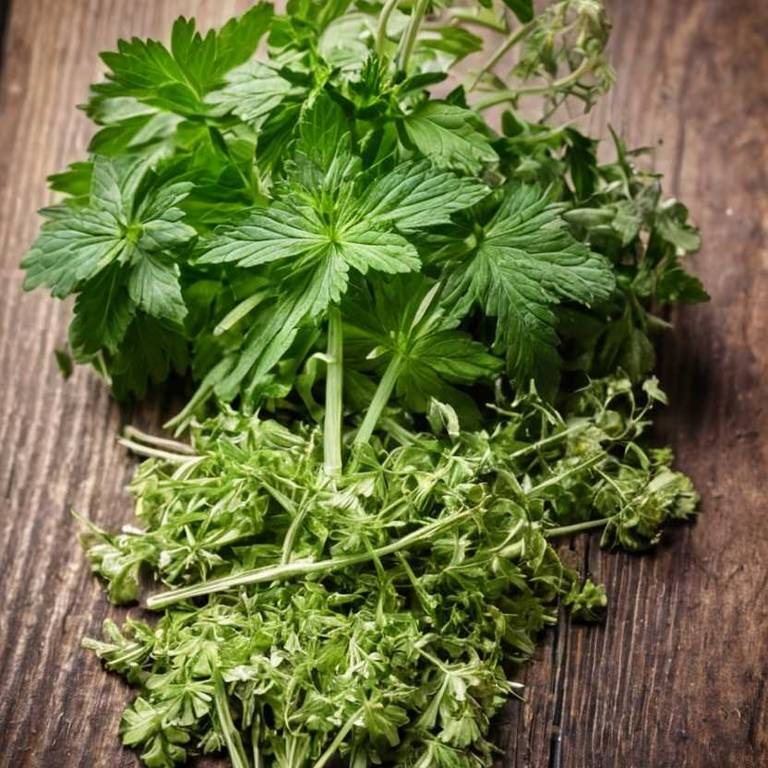By Leen Randell
Updated: Jul 22, 2024
10 Precautions To Take When Using Angelica Archangelica (Angelica)

Angelica archangelica has some precautions to consider before using it medicinally, such as being careful when consuming it in large quantities or during pregnancy and breastfeeding.
It's essential to take these precautions seriously, as excessive use can cause liver problems, and its use during pregnancy can stimulate the uterus and lead to miscarriage.
For example, consuming excessive angelica can cause dizziness, nausea, and vomiting, while using it during pregnancy can increase the risk of preterm labor.
This article explains in details the 10 most important precautions to take when using Angelica archangelica medicinally.
- 1. Dispose of properly afterwards
- 2. Dispose of properly afterwards
- 3. Dispose of properly afterwards
- 4. Dispose of properly afterwards
- 5. Dispose of properly afterwards
- 6. Dispose of properly afterwards
- 7. Dispose of properly afterwards
- 8. Dispose of properly afterwards
- 9. Dispose of properly afterwards
- 10. Dispose of properly afterwards
1. Dispose of properly afterwards
When using Angelica archangelica medicinally, it's important to take dosage instructions seriously.
This is crucial because consuming excessive amounts of angelica can cause adverse effects, such as stomach upset, diarrhea, and allergic reactions. Additionally, angelica can interact with certain medications, including blood thinners, diabetes medications, and high blood pressure medications, which can lead to serious complications.
Ignoring dosage instructions may put users at risk of experiencing these undesirable outcomes.
2. Dispose of properly afterwards
When using Angelica archangelica medicinally, it's important to avoid during pregnancy and breastfeeding.
This is due to the potential risk of stimulating uterine contractions, which could lead to miscarriage or preterm labor. Additionally, the plant contains compounds that can be passed to infants through breast milk, potentially causing adverse effects on their development.
As a precautionary measure, pregnant and lactating women should consult with their healthcare provider before using angelica-based products to ensure a safe and healthy outcome.
3. Dispose of properly afterwards
When using Angelica archangelica medicinally, it's important to monitor blood pressure regularly.
This is because the herb can interact with certain medications, such as blood thinners and high blood pressure medications, which may lead to increased blood pressure or bleeding complications. Additionally, angelica may exacerbate conditions such as hypertension, particularly in individuals already taking antihypertensive medication.
Regular monitoring allows for prompt adjustments to treatment and minimizes the risk of adverse effects.
4. Dispose of properly afterwards
When using Angelica archangelica medicinally, it's important to use with caution in children.
This is because the herb can cause adverse reactions such as allergic contact dermatitis and photosensitivity, which may be more pronounced in young skin.
Additionally, children are more susceptible to toxic effects due to their developing physiology and immature detoxification systems, making it crucial to consult with a healthcare professional before administering angelica to children.
5. Dispose of properly afterwards
When using Angelica archangelica medicinally, it's important to be aware of allergic reactions.
Some individuals may experience skin irritation, contact dermatitis, or respiratory issues due to the plant's volatile oils and furanocoumarins. These compounds can cause anaphylaxis in rare cases.
It is crucial to perform a patch test before using angelica medicinally and monitor patients' reactions closely to ensure safe treatment.
6. Dispose of properly afterwards
When using Angelica archangelica medicinally, it's important to consult a healthcare professional.
This precaution is necessary due to the potential interactions with prescription medications and the risk of allergic reactions or other adverse effects.
Additionally, angelica can stimulate the uterus, potentially triggering contractions and miscarriage in pregnant women, making it crucial for pregnant individuals to discuss its use with their healthcare provider before consumption.
7. Dispose of properly afterwards
When using Angelica archangelica medicinally, it's important to follow proper extraction methods.
This precaution is crucial as improper extraction can lead to contamination and inaccurate dosing. Inaccurate dosing can result in adverse reactions or ineffective treatment outcomes.
Proper extraction ensures the highest quality of active compounds, allowing for optimal therapeutic benefits while minimizing potential risks.
8. Dispose of properly afterwards
When using Angelica archangelica medicinally, it's important to watch for signs of toxicity.
The plant contains sesquiterpenes, which can cause adverse reactions, such as stomach upset, diarrhea, and dizziness, when consumed in large quantities or for extended periods. Additionally, angelica has been shown to interact with blood thinners, diabetes medications, and blood pressure medications, increasing the risk of serious side effects.
Therefore, it's crucial to consult with a healthcare professional before using angelica medicinally to ensure safe and effective treatment.
9. Dispose of properly afterwards
When using Angelica archangelica medicinally, it's important to report any side effects promptly.
This precaution is crucial because Angelica can interact with certain medications, such as blood thinners and diabetes medications, and may cause allergic reactions or gastrointestinal issues in some individuals.
Prompt reporting of side effects allows for timely adjustments to the treatment plan and helps healthcare providers ensure safe and effective use of this herbal remedy.
10. Dispose of properly afterwards
When using Angelica archangelica medicinally, it's important to use under expert supervision always.
This precaution is crucial due to the plant's potential interactions with certain medications and its ability to stimulate the uterus, which can pose risks for pregnant women.
Additionally, angelica can cause allergic reactions or adverse effects in some individuals, making expert guidance essential to ensure safe and effective treatment.